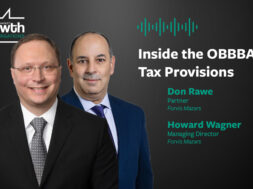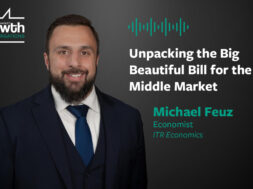Middle-Market Public Policy Roundup
Proposed rulemaking would roll back some Volcker Rule restrictions on banks, the Treasury's watchdog is investigating opportunity zones, and more.

With contributions by Maria Wolvin.
In this week’s roundup, we look at rulemaking that would roll back some private capital restrictions on banks. We also report updates on a congressional leader’s concerns over PE investment in manufactured housing, the SEC’s Small Business Capital Formation Advisory Committee, and the U.S. Department of the Treasury’s watchdog, which opened an inquiry into the management of the opportunity zone program.
Volcker Rule Proposal to Ease Investment Restrictions
U.S. regulators are set to roll back some Investment restrictions on banks investing with private funds, continuing a deregulatory streak.
Federal financial regulators, including the Federal Reserve and the Office of the Comptroller of the Currency, are expected to propose a rule change Jan. 30 that would reduce some Volcker Rule restrictions banks have when investing with venture capital funds.
According to a report from The Wall Street Journal, the proposal would remove the 3% limit on the stake banks can own in venture funds offered to clients, but limits would remain in place for private equity firms and other investments.
However, during a press conference on Jan. 29, Federal Reserve Chairman Jerome Powell seemed to indicate the rule could affect all “covered funds,” which includes private equity and other investment vehicles.
“We’ll be making a bunch of provisions that we believe are faithful to both the letter and the spirit of the law,” Powell said.
The amending is the latest in a deregulatory trend by policymakers in recent months, especially for the Volcker Rule. The regulation underwent major revisions last October, when federal financial regulatory agencies adopted a measure that would simplify Volcker Rule compliance requirements for banks.
Congressman Suspect of PE’s Role in Manufactured Housing
A leading Democrat in the Senate is requesting information from federal mortgage providers on housing, which could impact the way PE-owned housing properties are financed and what protections are available to residents.
In two letters released on Jan. 22, Sen. Sherrod Brown, D-Ohio, the ranking member of the Senate Committee on Banking, Housing, and Urban Affairs, requested government-sponsored enterprises Fannie Mae and Freddie Mac provide data on private equity-owned manufactured housing communities, or MHCs.
“The information I am requesting here will help me better understand Fannie Mae’s role in financing private equity-owned MHC properties and what resident protections, if any, are included in the Enterprise’s financing process,” Brown said in the letter.
According to the letters, an estimated 22 million people reside in manufactured housing, and they’re recognized by Fannie Mae and Freddie Mac among three underserved markets.
In recent years, private equity investors have purchased hundreds of thousands of units, some with financing from the federal mortgage enterprises. Brown worries investment could lead to lead to “unsustainable” rent increases–despite little data existing on MHCs and less on private equity’s involvement in them, the lawmaker said.
“I am increasingly concerned that investment in communities without regard for the needs of existing tenants could result in displacement and fewer, not more, affordable housing opportunities,” Brown said in the letters.
To increase the amount of data available, Brown is requesting the two organizations respond to a list of questions, although no deadline was given.
Fannie Mae and Freddie Mac–the shorthand reference to the Federal National Mortgage Association and the Federal Home Loan Mortgage Corporation–have not yet responded to the request.
Entrepreneurs’ Access to Capital on SEC Committee Agenda
A Securities and Exchange Commission committee will host an event where business leaders and government officials will discuss how entrepreneurs’ diverse capital needs are being met and where policy solutions may be needed.
The Small Business Capital Formation Advisory Committee will convene on Feb. 4 and will continue to explore funding gaps that impede growth opportunities for entrepreneurs and job creators.
Jenny Riegel, special counsel in the SEC’s Office of the Advocate for Small Business Capital Formation, will provide an overview of the Office’s 2019 Annual Report, with a focus on the state of small business capital formation.
The report includes data from various segments of the market, including small emerging businesses, mature and later-stage businesses and small public companies, as well as data on challenges faced by minority- and women-owned businesses, businesses in communities affected by natural disasters, and rural businesses.
In prior meetings, the committee members have discussed where gaps that impede growth opportunities for entrepreneurs and job creators exist in the allocation of capital from investors to small businesses. Data will assist in the continuation of that analysis.
James Gelfer, senior strategist and lead venture analyst for PitchBook will be presenting to the committee. Gelfer launched PitchBook’s venture capital coverage in 2012 and currently leads PitchBook’s research initiatives in private equity, venture capital and emerging technologies.
The afternoon session will feature speakers from two smaller regional funds as well as an entrepreneur, according to a press release.
The committee was established to provide the Commission with advice and recommendations on Commission rules, regulations, and policy matters relating to small businesses, from privately-held emerging companies to smaller public companies. Additional information on the committee, including its members, is available on its webpage.
Undue Influence with Opportunity Zones Target of Watchdog Inquiry
After a request by three members of Congress last October, the Treasury’s internal watchdog has opened an investigation into the department’s opportunity zone program, which will conclude in the months ahead.
In a story first reported by NBC News on Jan. 15, Acting Treasury Inspector General Richard Delmar announced the agency opened the inquiry in response to accusations that the program may have been altered to help close friends and supporters of the Trump administration.
“We are conducting an inquiry, and expect to complete our work and respond to the Congressional requesters in early spring,” Delmar said in a statement.
Allegations of misconduct were brought to the attention of the Treasury’s watchdog by Reps. Emanuel Cleaver, D-Mo., Ron Kind, D-Wis., and Sen. Cory Booker, D-N.J., who urged the department, in a letter dated Oct. 31, to review actions related to opportunity zones following reports of possible wrongdoing by senior Trump administration officials in implementing the program.
The program, based upon bipartisan legislation authored by Booker, Kind, and Senator Tim Scott, R-S.C., creates a tax incentive for individuals who reinvest unrealized capital gains into high-impact, long-term projects in high-poverty communities across the country based on nearly 9,000 census tracts.
Based on reports The New York Times and ProPublica published last October, the lawmakers allege senior members of the Treasury, including Secretary Steven Mnuchin, of stretching the policy to cover personal relationships and political supporters in census tracts that previously didn’t qualify.
“The underlying legislation … was intended to support the growth and revitalization of our nation’s most economically underserved communities,” the lawmakers said in the letter. “It was not the intent of Congress for this tax incentive to be used to enrich political supporters or personal friends of senior administration officials, as recent reports indicate.”
The investigation comes as a growing movement of lawmakers on Capitol Hill hope to ensure the benefits of the opportunity zone program go to its intended targets. Earlier this month, two more members of Congress sponsored legislation that would require opportunity zone funds to earmark additional resources to poor and rural communities.
Are you an ACG member who enjoys reading the public policy roundup? Join our Public Policy Interest Group to receive even more in-depth coverage of federal policy activity impacting the middle market, as well as opportunities to help shape ACG’s advocacy efforts.

Benjamin Glick is ACG Global’s marketing and communications associate.


